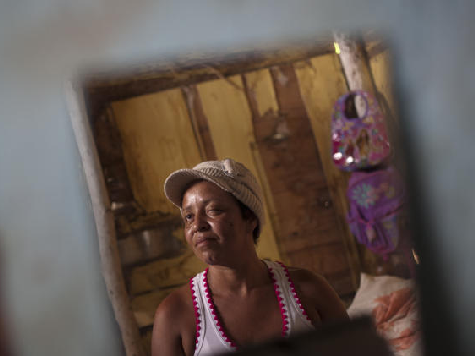
Government mismanagement and currency controls set by late Venezuelan president Hugo Chavez are being blamed for a collapse of the country’s health care system.
According to the Associated Press, with the Venezuelan government controlling the dollars needed to purchase medical supplies, medical care is becoming increasingly rare. Doctors sent home cancer patients last month when supply shortages and overtaxed equipment made it impossible for them to perform surgeries considered to be “non-emergency” in nature.
“I feel like I’ve been abandoned,” said Evelina Gonzalez, who was supposed to undergo cancer surgery in July following chemotherapy. Gonzalez ended up moving around from one hospital to another in search of an available operating table. Her left breast showed a dark tumor – now doubled in size – bulging through her spandex tank top. Gonzalez’ right eye is also swollen by glaucoma – diagnosed two years ago – but left untreated because she could not obtain a doctor’s appointment.
Gonzalez is on a list of 31 breast cancer patients waiting to have surgery to remove tumors at one of Venezuela’s largest medical facilities, Maracay’s Central Hospital. However, like many of the nation’s sick, she has been neglected by a health care system that, according to doctors, is deteriorating into a final state of collapse.
According to AP, physicians not associated with the government report that many patients began dying from illnesses that ordinarily are easy to treat when Venezuela’s downward economic slide accelerated after the death of Chavez from cancer last March. Doctors say it is hard to know how many have died since the government does not keep or publish such health statistics.
In short supply is almost every medical supply item needed to mend and heal, including needles, syringes, paraffin – used in biopsies to diagnose cancer – drugs, operating room equipment, X-ray film and imaging paper, and blood and the reagents needed to enable its use for transfusions. Anesthesia is also lacking for elective surgery.
In October, the Venezuelan government suspended organ donations and transplants. Dr. Douglas Natera, president of the Venezuelan Medical Federation, said that at least 70 percent of radiotherapy machines, used for treating cancer patients after surgery, are now inoperable in a country that has 19,000 cancer patients. He said this situation translates into less than 5,000 of them being able to be treated.
“Two months ago we asked the government to declare an emergency,” said Natera. “We got no response.”
The AP reported that it sought comment from Venezuela’s Health Minister, Isabel Iturria, but received no response to its repeated requests for an interview.
Last week, deputy health minister Nimeny Gutierrez denied on state television that the health system is in crisis and said medical supplies are arriving regularly from Cuba, Uruguay, Colombia, and Portugal. Gutierrez said that additional purchases “will let us be moderately relaxed until the end of the year.”
In response to an interviewer’s question about Central Hospital patients being forced to purchase their own supplies, Gutierrez replied, “It’s a hospital that received permanent stocks from us.”
Venezuela’s 1999 constitution guarantees free universal health care to its citizens. President Nicolas Maduro’s government states that it is complying, yet of the country’s 100 fully functioning public hospitals, nine of ten have only seven percent of the supplies they need, according to Natera.
The remaining 200 public hospitals were largely replaced by walk-in clinics run by Cuban doctors when Chavez took office. The clinics have won praise for delivering preventive care to the poor, but do not treat serious illnesses.
Venezuela’s private hospitals are now overburdened and severely lacking in supplies as well. Dr. Carlos Rosales, president of the private hospital association, said that 95 percent of their supplies must be imported. Comprising only 8,000 of the country’s more than 50,000 hospital beds, the private system must now treat 53 percent of Venezuela’s patients, including the 10 million public employees with health insurance. According to Rosales, insurers are four to six months behind in reimbursement payments.
In addition, government price caps set in July for common procedures are impossible to meet, said Rosales.
“The health care crisis is an economic crisis,” said Dr. Jose Luis Lopez, who oversees labs at the Municipal Blood Bank of Caracas. “It is not a medical crisis.”
The AP indicated that medical students “quietly” showed its journalists around “to avoid alerting government supporters, who bar reporters from recording images in public hospitals.” The journalists noted “broken anesthesia machines and battered stainless-steel instrument tables, some held together with tape, filled one of five idled operating rooms.” A stench and water from leaky pipes continue to seep into the rooms, said the doctors.
According to Natera, half the public health system’s doctors quit under Chavez, and half of those moved abroad. Now, support staff – victims of a wage crunch as income has fallen significantly – are leaving as well.
Under Chavez, Venezuela began purchasing most of its medical equipment through Cuba, China, and Argentina, a decision that critics say has led to considerable waste since it is cheaper to buy direct from a manufacturer.
Despite her inability to get the medical treatment she needs, Gonzelez says she “adored Chavez for his anti-poverty programs, always voted for him and constantly applied for government benefits, although she never received any.”

COMMENTS
Please let us know if you're having issues with commenting.